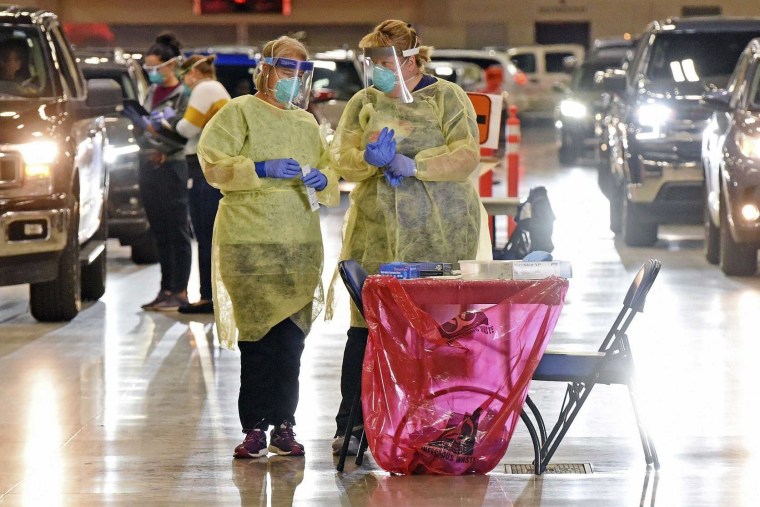There's plenty of news this week on coronavirus cases in the United States, and all of that news is discouraging.
Illinois, Indiana, Michigan, Nebraska and Wisconsin have seen a greater than 25 percent increase in coronavirus cases in the last two weeks compared to the two weeks before. Minnesota has reported more than a thousand new Covid-19 cases for six days in a row, something that hasn't happened since the start of the pandemic. Wisconsin set a single day record for coronavirus deaths on Tuesday with 31, the statistics show. And states like Idaho, Iowa, Kansas, South Dakota and Wyoming have some of the highest rates of new infections in the country, according to the Johns Hopkins University Coronavirus Resource Center.
Looking at the overall trajectory of U.S. cases since the start of the pandemic crisis, there was a peak in April, which slowly subsided, only to reach an even higher peak in July, which also slowly eased, until last month when case totals started climbing again. Yesterday, there were nearly 60,000 new cases -- a level unseen since August -- as well as over 1,000 American fatalities. Infection tallies are now climbing in roughly three-quarters of the nation's 50 states.
It led the New York Times to note that the country is now climbing toward "a third peak."
It's against this backdrop that a difficult political dynamic hangs overhead. Indeed, as coronavirus cases climb, it's not at all clear whether the White House thinks that's a good thing or a bad thing. By all appearances, it's the former. As the New York Times reported earlier this week:
The White House has embraced a declaration by a group of scientists arguing that authorities should allow the coronavirus to spread among young healthy people while protecting the elderly and the vulnerable -- an approach that would rely on arriving at "herd immunity" through infections rather than a vaccine.... On a call convened Monday by the White House, two senior administration officials, both speaking anonymously because they were not authorized to give their names, cited an October 4 petition titled The Great Barrington Declaration, which argues against lockdowns and calls for a reopening of businesses and schools.
Alas, we've been moving toward this point for a while. It was four weeks ago, for example, when the president participated in an ABC News town-hall event and said the coronavirus is "going away," even without a vaccine. When George Stephanopoulos was incredulous, the president added, "You'll develop -- you'll develop herd -- like a herd mentality. It's going to be -- it's going to be herd-developed, and that's going to happen. That will all happen."
As regular readers know, while there was some laughter surrounding his use of the phrase "herd mentality," instead of "herd immunity," what mattered was the fact that Trump was describing a strategy in which the virus "goes away" by having much of the country get infected.
When Stephanopoulos said such a tactic would lead to "many deaths," the president ignored the observation and just kept talking.
And now we know why. The White House, with increasing pride, is making clear that it's the administration's position that the virus should simply run its course through the U.S. population. It's a school of thought that effectively says that more infections is a positive development.
As NBC News reported overnight, dozens of scientists from around the world warned against the "herd immunity" approach in a letter published in The Lancet, a leading medical journal.
Herd immunity, which occurs when enough people become immune to a contagious disease to make further spread unlikely, is a "dangerous fallacy unsupported by the scientific evidence," the scientists wrote. The letter, signed by 80 researchers from the fields of public health, epidemiology, virology, infectious diseases and others, said relying on immunity among people who have recovered from Covid-19 is a flawed strategy.
Other experts, including those at the Infectious Diseases Society of America, are drawing the same conclusion. Dr. Yvonne Maldonado, an epidemiologist and infectious disease specialist at Stanford University Medical School, told USA Today yesterday that the "herd immunity" idea is "just ridiculous."
The president, taking guidance from a radiologist he saw on Fox News, apparently believes otherwise.

